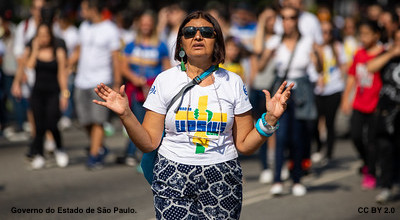home » Discrepant » Page 2
Discrepant
Discrepancias
Vol 3 Num 6 (2020)

Social outbreak in latin america and the caribbean: breakdowns, resistance and uncertainties. COVID-19’s challenges
- Breno Bringel
- Heriberto Cairo
- Maristella Svampa
- moderator Jaime Preciado
In this edition, the Discrepancies section intends to address the triggers of the social upheaval of 2019 in Latin America, its scope and limitations in the formation of the social subject, its instituting processes, destituyentes or constituents under various imaginary collective-community on parties, social movements or political regimes.
Coloquios interdisciplinarios
Vol 3 Num 6 (2020)

The evangelical people: hegemonic construction, minority disputes and conservative reaction
- Joanildo Burity
Latin American evangelical politics can be seen, in Laclauian terms, as a construction of the people. More precisely, as the construction of the evangelical people, a minority with demands and a voice of its own in a “Catholic” continent of secular states. It is an evangelical construction of a country’s people in contexts in which evangelicals are considered a sociopolitical force with hegemonic aspirations. However, this double narrative has become complicated in recent years in the rough seas of the so-called conservative wave. A prominent alliance between the political far-right, neoliberalism and the parliamentary and pastoral evangelical elite reverberates from Brazil, which creates serious issues for the expectations of a pluralist impact of the public evangelical presence.
Discrepancias
Vol 3 No. 5 (2020)

Shelters and refugees
- Danièle Bélanger
- Dolores Paris
- Eduardo Domenech
- moderator Rafael Alonso Hernandez Lopez
The crises that we are seeing in the Mediterranean, on the northern and southern border of Mexico or in South America, derived from the massive mobilizations of people fleeing their countries, force us to reflect on the role that the States in the face of the arrival and / or transit of displaced persons and refugees, in the face of what appears to be a regressive global policy, based on the externalization of borders, restriction and selectivity.
Discrepancias
Vol 2 Num 4 (2019)

Traditionalisms, fundamentalisms, fascisms? The advance of conservatism in Latin America
- Catalina Romero
- Fabio Lozano
- Joanildo Burity
- Miguel Angel Mansilla
- Renée de la Torre
- Rodrigo Toniol
- moderator Veronica Giménez Béliveau
The consolidation of conservative projects supported by political and religious actors in Latin America is not a novelty: the continent has seen advances and crises of popular governments, bloody dictatorships, violent speeches and rights expansion processes that are carried out with different intensity and decoupled temporalities in different countries. The ways of naming this trend are the subject of discussion in this section, since the naming itself is a problem: they are expressions made up of diverse sectors socially and even politically, claiming transformations of varying thickness as the context allows them. Based on these ideas, we organized our discussion around three questions, which the authors answered based on the experience of each country.
Discrepancias
Vol 2 No 3 (2019)

Sexual and reproductive rights of women in Latin America under debate
- Alma Luz Beltrán and Puga
- Angelica Peñas Defago
- Marta Rodriguez from Assis Machado
- moderator Rachel sieder
The arrival of sexual and reproductive rights on the public agenda marked a new moment in the dynamics between law and society in Latin America. But despite important regional and international advances in guaranteeing sexual and reproductive rights in recent years, these often provoke tensions between those who favor their recognition and those who oppose them. In the discrepancy of this issue of Inserts, we hope to clarify some of the main points of the debate around this topic so fundamental for the life and health of women, and for social equality in Latin America.
Discrepancias
Vol 1 Issue 2 (2018)
Nation and racism. October 12 in the construction of Latin American societies
- Alexander Grimson
- Alicia Castellanos
- Irma A. Velasquez Nimatuj
- moderator Santiago Bastos
Keywords: October 12, Latin America, nation, racism.
WOn October 12, 1492, the ships chartered by the Crown of Castile under the command of Admiral Christopher Columbus touched down in what would later be known as America. This date is so charged with symbolism that it is part of the civic calendars of almost all the countries of the subcontinent, referring to the relationship between the "mother country" and the republics, their "daughters" despite the sacred independence. We take this date to ask three social scientists how the always conflictive relationship of the Latin American republics with their colonial origins, with the original populations and with the Creole legacy in their formation as nations occurs in their respective countries.
Discrepancias
Vol 1 Issue 1 (2018)

Discrepancies around the Internal Security Law
- Alejandro Madrazo Lajous
- Julia Estela Monárrez Fragoso
- Salvador Maldonado
- moderator Manuela Camus Bergareche
In December 2006, the president of Mexico, Felipe Calderón, declared the “war against drugs” and called out the Army to confront criminal groups in the streets. This public security task does not correspond specifically to the functions of the Armed Forces and, among other consequences, has led to a disproportionate increase in homicides and disappearances in the country. Despite this, the Internal Security Law is presented, which institutionalizes this militarization process and justifies, regulates and legalizes the role of the armed forces in the fight against organized crime. There are many questions that arise in this context and we hope that the guests of this Discrepancies section will contribute to animate the debate, perhaps to clarify it.






